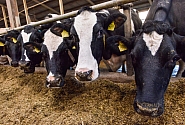
On Thursday, 22 February, the Saeima adopted amendments to the Law on Agriculture and Rural Development prohibiting the import of agricultural and animal feed products from the Russian Federation and the Republic of Belarus for consumption in Latvia.
Previously Jānis Reirs, Chair of the Budget and Finance (Taxation) Committee of the Saeima, which was responsible for the amendments, noted that the amendments were drafted as an alternative to the proposal submitted by a group of MPs. “MPs had suggested that the prohibition on Russian and Belarussian products be enacted not only in Latvia, but throughout all member states of the European Union. Due to the fact that this would affect the common policy of the European Union, which is beyond our competence, the prohibition on imports shall apply only to consumption of agricultural and animal feed products in Latvia,” Reirs said.
According to the amendments, such products originating in Russia or Belarus shall also not be imported from third countries. The prohibition on imports shall apply to agricultural and animal feed products remaining in Latvia, not those transported to elsewhere within in the European Union (EU).
This initiative is an additional element in the common EU sanction policy enacted in response to Russia’s war of aggression against Ukraine. Taking into consideration the fact that Russia’s aggression in Ukraine is continuing, proposals for further sanctions are also being elaborated seeking opportunities to strengthen the existing sanctions, as well as set new ones to restrict income of the aggressor and its ability to perpetrate war in Ukraine – this is noted in the annotation to the amendments.
“Economic security is a crucial aspect of national security and it is an area that has an immense impact on national security. Perpetrating international crimes with impunity and benefiting therefrom goes against the morals of society, ethical standards and our system of values. Consumption of products of Russian origin, thus supporting the criminal regime either directly or indirectly is incompatible with the morals of society,” Reirs explains the need for the amendments.
According to data compiled by the Ministry of Agriculture, over the course of the first 10 months of the previous year, imports of agricultural and animal feed products from Russia into Latvia accounted for 280 million euros. Four main product groups: animal feed, grain, peas and rapeseed oil accounted for 90% of the agricultural products imported into Latvia from Russia.
With the amendments the Saeima has tasked the Cabinet of Ministers to adopt, within two weeks of the amendments coming into force, rules specifying the agricultural and animal feed products, which may not be imported into Latvia from Russia and Belarus. Likewise, the Cabinet of Ministers must also perform an assessment and report to the Saeima by 1 March of next year on the impact of the prohibition on the economy and the interests of society.
Saeima Press Service







